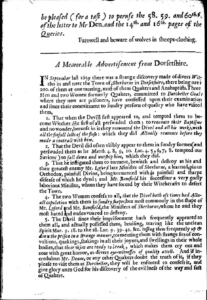Place Name

William Lyford (1598 – October 3, 1653), was a nonconformist clergyman said to be of “great modesty and virtue” but who is said to have died as a result of witchcraft. He was born at Peasemore, Berkshire, the son of the rector, also called William Lyford and his wife, Mary Smith. He entered Magdalen College as a commoner on April 26, 1615, became a demy (scholarship holder) in 1617, and graduated on December 16, 1618. He became vicar of Sherborne, Dorset, in 1631. His “zealous” Calvinistic views left him undisturbed during the civil war but he was tormented with a painful and sharp disease, “by the witchcraft as it is said of certain Quakers.” He was buried in the Chancel of Sherborne Church. But the story did not end there. He was replaced by a Francis Bampfield who said to have instigated an investigation into what he termed “quakering witches”. Dorchester judges issued an order to nobility members, tasking them with investigating the “witchcraft and consultation with the Devil and evil spirits in Sherborne.” Although the court order did not explicitly mention the Quakers, it followed soon after a clandestine meeting of over 200 (supposed) witches in the town and the arrest of three men and two women, either Quakers and Anabaptists, who were accused of consorting with the Devil to bring about Lyford’s demise. The Extours Facebook account explains: “The accounts of this witches’ meeting, revealed through the confessions of the accused, painted a chilling picture of temptations by the Devil and malevolent acts resulting in Lyford’s death and the affliction of disease. The details of their confessions were disseminated through various anti-Quaker pamphlets, adding fuel to the pervasive fear of the supernatural that gripped the collective consciousness in 1659 and 1660. While the confessions shed light on the alleged crimes, the fate of the accused Quakers remains obscured in the shadows. The judicial records, although acknowledging the event, provide no clear account of the sentences meted out to those who had confessed to consorting with dark forces.” This road was developed over land which was part of Brentwood Farm (previously Garratt Farm) that was in the manor of All Farthing. A least a part of the manor was owned by Thomas Sheppard (1728 – 1814) a Doctor of Divinity from Magdalen College. When he died his fortune was left to his wife Sophia Sheppard, who became a generous benefactor to her husband’s former college, leaving them extensive land in Earlsfield.
![]()
